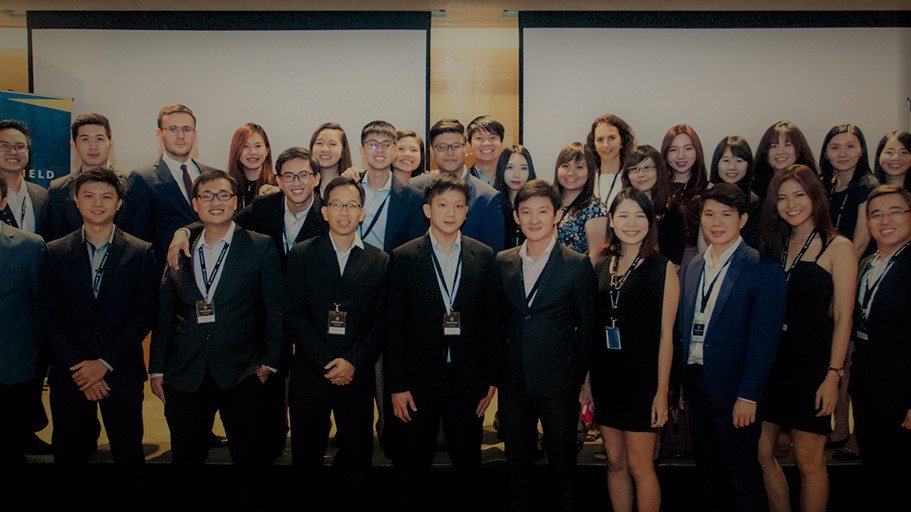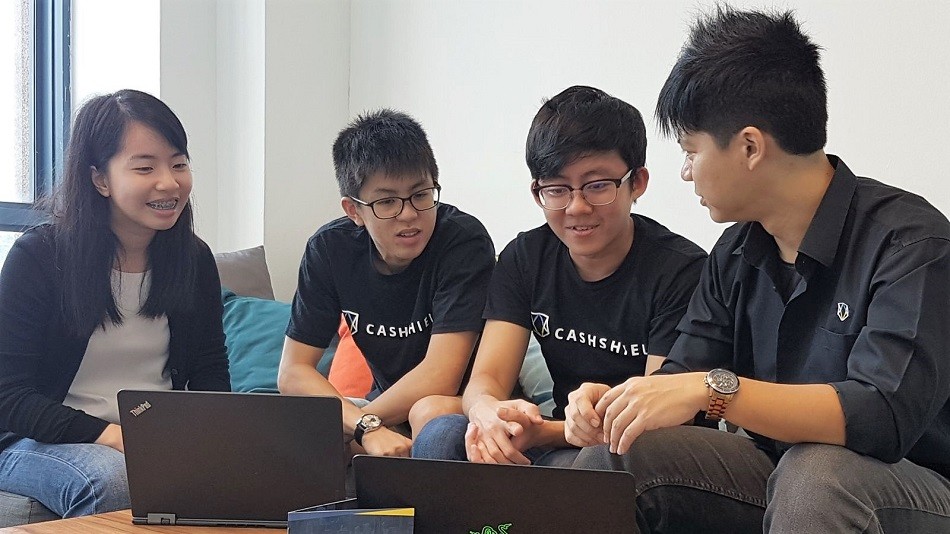
The CashShield team. Photo credit: CashShield.
When Justin Lie approached clients in 2011 with his cyber security solution, he faced raised eyebrows and quizzical looks. Back then, the concept of automation using machine learning had nowhere near the draw it has today. Fast-forward to 2017 and his startup CashShield has clients all over the world, with three international offices and a fourth on the way – plus it’s profitable and growing rapidly.
At the time, machine learning sounded ridiculous.
The Singapore-based company started out as CashRun in the late 2000s, after co-founder and CEO Lie’s own websites were hit by credit card fraud. Even as a teen, Lie had been making websites to sell items on eBay. Coming face to face with the problem of fraudulent transactions, he thought of an automated way to track down and flag illicit behavior.
Lie successfully tested the initial product with a gaming company in Germany. Then it was time for the hard part: develop and refine the technology, and convince clients of its value.
“Imagine pitching to clients that machine learning was going to solve all their problems and they would no longer need humans to look at transactions manually. At the time it sounded ridiculous,” he tells Tech in Asia.
Digital guardian
CashShield uses machine learning to track user behavior patterns on websites that involve financial transactions, like ecommerce stores. The startup has developed its own software from scratch with real-time pattern recognition and passive biometric analytics capabilities (where the subject doesn’t know the identification process is happening).
These impressive-sounding phrases mean the system can detect patterns in, for example, mouse movements and typing speed or in devices being used, in order to distinguish between legitimate and fraudulent users.
If such behavior is detected, the system rejects the transaction automatically, with no need for human input.
The data it gathers helps protect clients from payment fraud, fake account creation, account takeovers, and promo abuse (when fraudsters create new accounts in bulk to exploit sign-up incentives). The startup is so confident in its automated system’s effectiveness that it offers a 100-percent chargeback guarantee in case of failure – meaning it will reimburse its clients for fraudulent transactions that break through its defenses.
It took CashShield five years to research and refine its tech, but the time spent helped cement the company’s competitive advantage. “If you look at a lot of AI or machine learning tools, they are usually built around a common framework,” Lie says. “So a lot of solutions end up looking pretty alike.”
The startup has been rewarded for its efforts with big-name clients all over the world, which allowed it to secure “billions in gross merchandise volume” and become profitable very quickly. The list includes companies like Razer, Alibaba, Square Enix, T-Mobile, and Vodafone. It opened offices in Berlin, Jakarta, and Shanghai, funding operations largely out of its own pocket.
While Lie doesn’t reveal specific figures, he says CashShield has been seeing a 200-percent growth rate in revenue every year and has increased the contracts it has signed by 1000 percent in the past 12 months.
Until recently it has been able to forge ahead without worrying about external funding, meaning it could be picky when it came to external investors. More than funds, it needed go-to-market expertise and strategic partners that could help it grow further.

CashShield team members, including co-founder Junxian Lee (R) hard at work. Photo credit: CashShield.
Bonus cash
Now it seems it has found those partners. The startup announced its US$5.5 million series A round today, led by US-headquartered fund GGV Capital. The round was joined by Heliconia Capital Management (a unit of Singapore’s Temasek Holdings), Razer, Stream Global, and Tony Fadell, designer of the iPod and co-founder of smart home startup Nest Labs.
GGV Capital managing partner Jenny Lee will join CashShield’s board of directors under the deal.
The company also announced it is opening an office in Menlo Park, the Silicon Valley town mostly known for hosting Facebook’s headquarters.
CashShield has received several accolades. It won the top SME award for a company with a Singaporean founder at last year’s Fintech Awards by the Monetary Authority of Singapore.
CashShield was able to go global without worrying about external funding.
Early this year it was evaluated by the Infocomm and Media Development Authority (IMDA) as part of its accreditation program. The startup was pleased with this development, as IMDA’s three-month testing process put its technology and business under intense scrutiny.
The resulting validation by Singapore’s government helped a lot in conversations with international investors as well as high-profile clients in markets around Southeast Asia. “It’s more than we expected, to be honest,” Lie jokes.
CashShield will continue working with international clients. “Once you cross borders, fraud becomes exponentially more difficult to handle. This is where we have a lot of opportunities,” Lie says.
The startup’s vision is to be a global risk management enterprise, catering to clients including telcos, airlines, big retailers, and so on, tackling challenges from transaction monitoring to database breaches. “We want to be an all-rounder cyber security company to help companies solve all areas of potential fraud risk,” he adds.
This post This Singaporean startup closed its series A today, but went global long before that appeared first on Tech in Asia.
from Tech in Asia https://www.techinasia.com/cashshield-profile-series-a-funding
via IFTTT
No comments:
Post a Comment